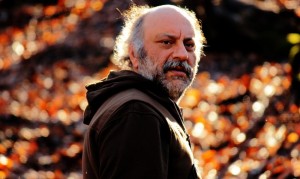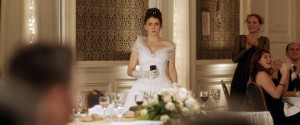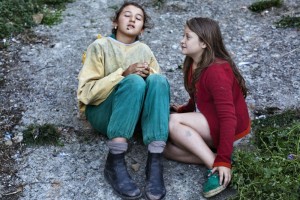AFI Fest, the longest-running international film festival in Los Angeles, has taken off at Hollywood Boulevard. Over the next week, directors from around the world, including new auteurs and renowned award-winners, will be making appearances at the TCL Chinese Theater, the Egyptian Theater and the Dolby Theatre to support their newest projects, with numerous awaiting fans in tow.
A&E; senior staffer Sebastian Torrelio will be attending AFI Fest this week, scoping out the newest selections on the festival circuit and films that may be coming to American audiences in the near future. On the fourth day of AFI Fest coverage, strange stories and filmmaking methods were prevalent in four films that were mostly hit and miss, save for one very entertaining possible future success.
“Fish & Cat”
Directed by Shahram Mokri
“Fish & Cat” is, at the same time, the most disappointing, the most intriguing, the most confusing and the most ambitious film at the festival. Having shot his movie entirely in one take, Iranian director Shahram Mokri plays with ideas of horror and thriller films within the scope of an impressively odd 134 minutes of seamless camera work. He starts with two older gentlemen, mysterious personalities who appear to run some sort of butchery. They wander into the woods to find a camp of students, all gathered at a nearby lake for a yearly kite competition. Over the course of the film, Mokri’s camera walks around the camp, taking in conversations and observations that the students have with one another and the unsettling older gentlemen.
Mokri’s screenplay is almost as interesting as his style: All of the events in “Fish & Cat” seem to happen in displaced time, jumping around between earlier events and later events from different perspectives in the campsite. Because of this, “Fish & Cat” doesn’t have much of a consistent plotline to keep the viewer’s attention – most of what makes “Fish & Cat” worth watching is its technical ambition. In fact, Mokri’s experimental work, having no satisfying conclusion or resolutions to tie up its many non-sequitur moments, is pretty frustrating, a test of audience patience if there even was one. But “Fish & Cat” is, at least, a good bit of moviemaking exercise.
“Happy Valley”
Directed by Amir Bar-Lev
Music Box Films

Director Amir Bar-Lev can’t entirely tell which subject to focus on in his latest documentary “Happy Valley.” On one hand, Bar-Lev wants to retell the story of Jerry Sandusky, former assistant football coach at Pennsylvania State University before his conviction for child molestation in 2011. Bar-Lev looks at the reactions by the students and by those close to Sandusky, most of whom were ignored by the media at the time. And like the media, Bar-Lev gets warped by the bigger picture: the firing of Penn State coach Joe Paterno, who was considered one of the best football coaches in the NCAA before he was penalized for his actions during the scandal.
Bar-Lev makes a clear proposition about Paterno from the point of view of the college’s students: In image, Paterno was holy. Everyone around him revered him to an impressive level, going so far as to mass riot in the school when news of his firing broke. “Happy Valley” takes its stance fairly, looking into why Paterno was fired after not contacting the authorities more than a decade earlier, but also reaching into the impact that Sandusky, Paterno and several other members of Penn State’s coaching team had on their community. Within the scope of the movie, child molestation isn’t an offense taken lightly, but it also isn’t the focus of the tale at hand. Bar-Lev’s biggest message is that of severity, and how the public, as well as authority, can become blinded by the media, by the crowd and even by relentless hero worship.
“Wild Tales”
Directed by Damián Szifrón
Sony Pictures Classics
“Wild Tales” is an anthological movie done right in nearly every possible way. With a Quentin Tarantino-esque brand of comedy, Argentinian director Damián Szifrón weaves six short vignettes into a story that feels satisfyingly thematic and enjoyable. What’s amazing is that none of the six pieces is connected plot-wise to another – though each features different actors – yet all feel like a solid stand-alone work. Starting with the opening tale, one of a mysteriously coincidental plane ride that goes awry for its passengers, Szifrón shows the audience his type of humor: fairly dark and not entirely realistic, but all too hilarious.
The rest of the short pieces play out with similar ideas: Revenge is a rampant disease, one that brings out the worst in people and generally never bodes well for the instigator. From a car being towed to restaurant poisonings to a fit of road rage, each of Szifrón’s shorts flows into the next without seeming stunted or held back. Though not presented in any significant order – Szifrón stated during his post-screening Q&A; that the shorts are simply presented in the way he had written them – “Wild Tales” can’t help but feel complete. It even ends on an emotional note: a couple having a troubling wedding ceremony. Each story is accessible enough to understand from a casual perspective – most everyone has had car trouble before, made a costly mistake or even been mad at the government. Szifrón reflects all of these everyday feelings in his film, but they are pumped up to extreme, laugh-out-loud measures to create the most entertaining entry in the festival so far.
“The Wonders”
Directed by Alice Rohrwacher
The Grand Prix winner at this year’s Cannes Film Festival, director Alice Rohrwacher’s “The Wonders” is a story of maturity in more ways than one. Rohrwacher shines through with her elegant tale of growing up, even if that growing is in a bit of a strange environment. The film highlights Maria Alexandra Lungu as Gelsomina, the eldest of four sisters, and also their guardian, for all intents and purposes. Gelsomina is told by her strangely strict parents to keep her sisters in line as head of the household while her father works on beekeeping, a career he hopes to pass on to his children. Gelsomina’s life is traditional, sticking to only the most simple technologies to keep her family afloat, and her parents won’t have it any other way.
When she has finally had enough of their overly dull protectiveness, Gelsomina enters a produce competition. “The Wonders” keeps a genuinely good heart when telling its familial story but doesn’t keep too grounded in the thematic goals it sets out for itself. Like the best of European realism directors, Rohrwacher makes mysterious choices, but compelling ones, letting the girls at the center of her work run with the material. In the end, she creates something compellingly beautiful and conceivably emotional, despite a concluding 15 minutes that threatens to tear her work apart. But that’s what Rohrwacher wants. Her film isn’t an ordinary one; it’s more than that. It’s something that an audience can, and hopefully will, learn to appreciate and a sign from a filmmaker learning to express herself.
– Sebastian Torrelio



